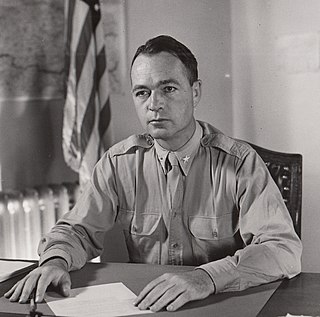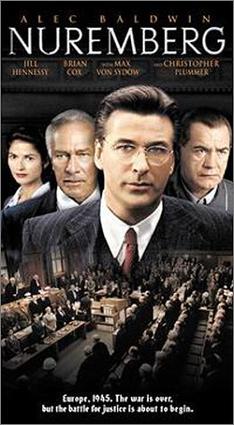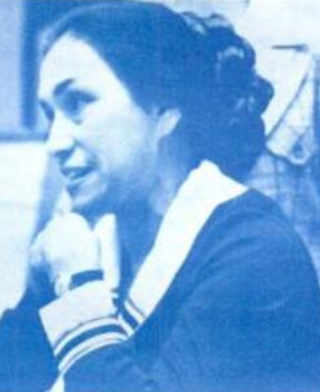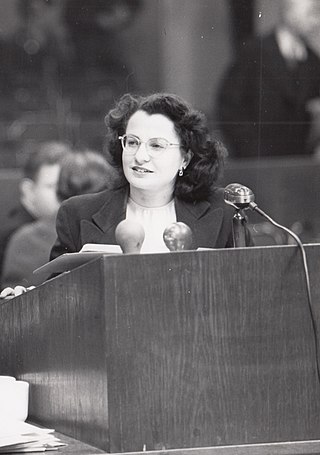
The Nuremberg trials were held by the Allies against representatives of the defeated Nazi Germany for plotting and carrying out invasions of other countries across Europe and atrocities against their citizens in World War II.

Robert Houghwout Jackson was an American lawyer, jurist, and politician who served as an associate justice of the U.S. Supreme Court from 1941 until his death in 1954. He had previously served as United States Solicitor General and United States Attorney General, and is the only person to have held all three of those offices. Jackson was also notable for his work as Chief United States Prosecutor at the Nuremberg trials of Nazi war criminals following World War II.

The International Military Tribunal for the Far East (IMTFE), also known as the Tokyo Trial and the Tokyo War Crimes Tribunal, was a military trial convened on 29 April 1946 to try leaders of the Empire of Japan for their crimes against peace, conventional war crimes, and crimes against humanity, leading up to and during the Second World War. The IMTFE was modeled after the International Military Tribunal (IMT) at Nuremberg, Germany, which prosecuted the leaders of Nazi Germany for their war crimes, crimes against peace, and crimes against humanity.

John Johnston Parker was an American politician and United States circuit judge of the United States Court of Appeals for the Fourth Circuit. He was an unsuccessful nominee for associate justice of the United States Supreme Court in 1930. He was also the United States alternate judge at the Nuremberg trials of accused Nazi war criminals and later served on the United Nations' International Law Commission.

Telford Taylor was an American lawyer and professor. Taylor was known for his role as lead counsel in the prosecution of war criminals after World War II, his opposition to McCarthyism in the 1950s, and his outspoken criticism of American actions during the Vietnam War.

The Judges' Trial was the third of the 12 trials for war crimes the U.S. authorities held in their occupation zone in Germany in Nuremberg after the end of World War II. These twelve trials were all held before U.S. military courts, not before the International Military Tribunal, but took place in the same rooms at the Palace of Justice. The twelve U.S. trials are collectively known as the "Subsequent Nuremberg Trials" or, more formally, as the "Trials of War Criminals before the Nuremberg Military Tribunals" (NMT).

The subsequent Nuremberg trials were twelve military tribunals for war crimes committed by the leaders of Nazi Germany (1933–1945). The Nuremberg Military Tribunals occurred after the Nuremberg trials, held by the International Military Tribunal, which concluded in October 1946. The subsequent Nuremberg trials were held by U.S. military courts and dealt with the cases of crimes against humanity committed by the business community of Nazi Germany, specifically the crimes of using slave labor and plundering occupied countries, and the war-crime cases of Wehrmacht officers who committed atrocities against Allied prisoners of war, partisans, and guerrillas.

Henry T. King Jr. was an American attorney who served as a U.S. Prosecutor at the Nuremberg Trials in 1946-47. Late in his career, he became a law professor and an activist, writer, and lecturer working on international law and war crimes; David M. Crane has described King as "the George Washington of modern international law".

Patrick Errol Higginbotham is an American judge and lawyer who serves as a Senior United States circuit judge of the United States Court of Appeals for the Fifth Circuit.

Superior orders, also known as the Nuremberg defense or just following orders, is a plea in a court of law that a person, whether a member of the military, law enforcement, or the civilian population, should not be considered guilty of committing crimes that were ordered by a superior officer or official.

The following is a bibliography of works devoted to the Nuremberg Trials.
Gabrielle Anne Kirk McDonald is an American lawyer and jurist who, until her retirement in October 2013, served as an American arbitrator on the Iran–United States Claims Tribunal seated in The Hague.

Nuremberg is a 2000 Canadian-American television docudrama in 2 parts, based on the book Nuremberg: Infamy on Trial by Joseph E. Persico, that tells the story of the Nuremberg trials. Actual footage of the Nazi Concentration Camps (film) was included in this miniseries.

Michael P. Scharf is co-dean, Joseph C. Hostetler – BakerHostetler professor of law, and the director of the Frederick K. Cox International Law Center at Case Western Reserve University School of Law. Scharf is also co-founder of the Public International Law & Policy Group (PILPG), a non-governmental organization (NGO) which provides pro bono legal assistance to developing states and states in transition. Since 1995 PILPG has provided pro bono legal assistance to states and governments involved in peace negotiations, drafting post-conflict constitutions, and prosecuting war criminals. Since March 2012, Scharf has also been the producer and host of Talking Foreign Policy, a one-hour radio program aired on a quarterly basis on Cleveland’s NPR affiliate WCPN 90.3 ideastream.
Francis M. Shea was an American lawyer, law professor and United States government official.

Rudolf Lehmann was a German jurist and military judge who was the Judge Advocate General of the Wehrmacht in World War II. Lehmann was found guilty of war crimes at the High Command Trial at Nuremberg in 1948. He had close ties with Nazi Germany, but was not a member of the Nazi Party.
Frank Nelson Richman was an American lawyer, politician, and judge who served as a justice of the Indiana Supreme Court from January 6, 1941, to January 6, 1947. Richman also participated as a judge in the Nuremberg trials, as one of the judges of the Flick trial.

Adelfa Botello Callejo was an American lawyer and civil rights activist of Mexican descent. She was a recipient of the Mexican government's Ohtli award, the Dallas Bar Association's Martin Luther King, Jr. Justice Award, the League of United Latin American Citizens Hispanic Entrepreneurship Award, the Mexican American Bar Association of Texas Lifetime Achievement Award, and the Sandra Day O'Connor Award.

Joseph Dainow (1906–1978) was a Canadian-American professor of law. He was born and grew up in Montreal, Canada, and received a law degree from McGill University but spent most of his life in Baton Rouge, Louisiana, where he was professor of law at Louisiana State University.

Cecelia Helen Goetz was an American lawyer and bankruptcy judge who served as a prosecutor at the Nuremberg trials.















